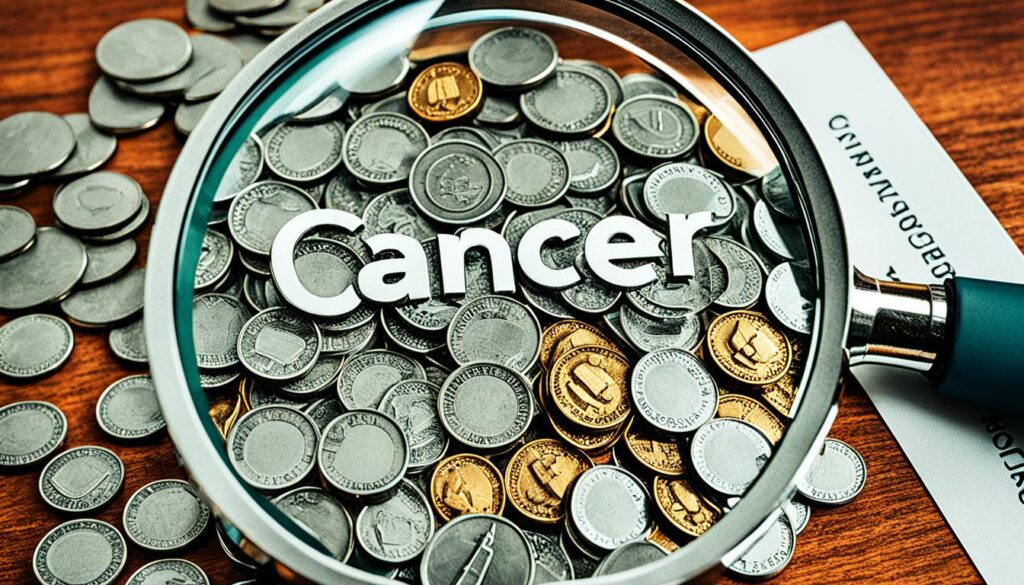When it comes to your health and financial security, it’s essential to be prepared for any situation that may arise. Cancer insurance is a supplemental health insurance that can provide valuable coverage and peace of mind in the face of a cancer diagnosis.
While primary health insurance covers many medical expenses, there are often out-of-pocket costs and other financial burdens that can add up quickly. Cancer insurance can help offset these expenses and provide additional support during your cancer treatment journey.
Cancer insurance policies are available in all states and offer complete details of coverage. From medical expenses to out-of-pocket costs, cancer insurance can help fill the gaps left by your primary health insurance and ensure that you have the financial resources you need to focus on getting well.

Key Takeaways:
- Cancer insurance is a supplemental health insurance that provides coverage for medical expenses and out-of-pocket costs not fully covered by primary health insurance.
- It is available in all states and offers complete details of coverage, ensuring that you have the essential coverage you need.
- Cancer insurance can help provide financial support in the event of a cancer diagnosis, giving you peace of mind during a challenging time.
- It is worth considering for individuals with a family history of cancer or high-deductible health plans.
- There are various types of cancer insurance policies available, including lump-sum cash benefits and critical illness insurance.
Understanding Cancer Insurance
Cancer insurance is a type of supplemental health insurance that can provide payment to offset the costs of cancer treatments and other associated expenses. It is designed to work in conjunction with primary health insurance and provides additional financial support in the event of a cancer diagnosis.
Also Read : Comprehensive Coverage: Health Insurance For Diabetic Patients
Cancer insurance can help cover a wide range of medical expenses, including hospital stays, surgeries, chemotherapy, radiation therapy, and other cancer treatments. It can also provide coverage for non-medical expenses such as transportation and childcare, helping to ease the financial burden that often comes with a cancer diagnosis.
Also Read : Blossoming Protection: Maternity Health Insurance For Expecting Mothers
For individuals with a family history of cancer or high-deductible health plans, cancer insurance can be particularly beneficial. It offers an extra layer of financial protection and peace of mind, ensuring that the costs of cancer treatments are not a source of stress.
“Cancer insurance can provide payment to offset the costs of cancer treatments and other associated expenses.”
When considering cancer insurance, it’s important to review your primary health insurance policy to understand what is covered and what out-of-pocket expenses you may be responsible for. Cancer insurance can fill in the gaps, providing financial support where your primary insurance falls short.
Also Read : Senior Care Assurance: Navigating Senior Citizen Health Insurance
It’s also worth noting that cancer insurance is available to individuals regardless of their current health. Unlike some insurance policies that may require medical underwriting or pre-existing condition exclusions, cancer insurance is typically available to all individuals, regardless of their health history.
Also Read : One Plan, Many Benefits: Discovering The 1 Core Health Insurance Plan
When shopping for cancer insurance, it’s important to compare policies from different providers to find the coverage that best suits your needs. Consider factors such as the premium, coverage limits, waiting periods, and any exclusions or limitations that may apply.
Also Read : Prioritize Your Health: Individual Health Insurance Choices
Benefits of Cancer Insurance
There are several key benefits to having cancer insurance:
- Financial support: Cancer insurance can help offset the costs of cancer treatments and related expenses, providing the financial support needed to focus on recovery.
- Flexibility: Cancer insurance benefits can be used to pay for a wide range of expenses, including medical bills, prescription medications, transportation, and household expenses.
- Peace of mind: Having cancer insurance can provide peace of mind, knowing that you have additional financial support in the event of a cancer diagnosis.
By understanding the benefits of cancer insurance and how it can provide financial support during a difficult time, individuals can make informed decisions about their healthcare coverage.
How Does Cancer Insurance Work?
Cancer insurance is a type of supplemental health insurance that operates by providing lump-sum payments directly to the insured individual. Unlike traditional health insurance, which pays healthcare providers for covered expenses, cancer insurance pays the insured individual directly. This allows them to use the payment to cover any expenses related to cancer treatment or other needs.
It’s important to note that cancer insurance policies may have a waiting period before benefits kick in. During this waiting period, individuals may not be eligible to receive the lump-sum payment if they are diagnosed with cancer. The waiting periods can vary depending on the specific policy and insurer.
Additionally, the covered expenses under a cancer insurance policy can vary based on the specific policy and the types of cancer covered. Some policies may cover a broad range of cancer types, while others may have more restrictions. It’s crucial to read the policy carefully to understand any policy restrictions or exclusions that may apply to the coverage.
“Cancer insurance operates by providing lump-sum payments directly to the insured individual, allowing them to cover any expenses related to cancer treatment or other needs.”
Understanding how cancer insurance works and the specific details of a policy is essential to ensure individuals have the coverage they need. Being aware of waiting periods, covered expenses, and policy restrictions empowers individuals to make informed decisions when selecting a cancer insurance policy.

Is Cancer Insurance Worth It?
The decision of whether cancer insurance is worth it depends on individual circumstances. For individuals with a family history of cancer or high-deductible health plans, cancer insurance can provide financial peace of mind in the event of a cancer diagnosis. Cancer is a common diagnosis, with one in two men and one in three women in the US at risk of developing cancer in their lifetime. Having the added support of cancer insurance can help alleviate some of the financial burden and allow individuals to focus on their health and recovery.
While primary health insurance may cover some of the medical expenses associated with cancer treatment, it may not cover the full cost. Cancer insurance can help bridge the gap and provide additional coverage for expenses such as deductibles, co-pays, and non-medical costs like transportation and childcare.
By having cancer insurance, individuals can have financial peace of mind knowing that they have a safety net in place to help with the costs of treatment and recovery. It can provide a sense of security and allow individuals to focus on their health without the added stress of financial obligations.
It’s important to consider your own family history of cancer and the potential financial impact of a cancer diagnosis when deciding whether to invest in cancer insurance. While no one wants to think about the possibility of getting cancer, having a plan in place can provide a sense of security and assurance.
Furthermore, for individuals with high-deductible health plans, cancer insurance can be especially beneficial. High-deductible plans often require individuals to pay a significant amount out-of-pocket before their coverage kicks in. Cancer insurance can help cover these high initial costs and provide financial peace of mind.

Having cancer insurance contributes to financial peace of mind in the face of a cancer diagnosis. It’s important to review the details of different cancer insurance policies and choose the one that suits your needs and budget the best. By being prepared with cancer insurance, individuals can be confident in their ability to face the financial challenges that can arise from a cancer diagnosis.
How to Get Cancer Insurance
Obtaining cancer insurance is essential for protecting yourself and your loved ones from the financial impact of a cancer diagnosis. There are two main ways to get cancer insurance: through an employer-sponsored group benefit or by purchasing an individual plan from an insurance provider.
If you have employer-sponsored health insurance, check if cancer insurance is included in your benefits package. Many employers offer cancer insurance as a supplemental plan to provide additional coverage beyond their primary health insurance. You can obtain cancer insurance through your employer during open enrollment periods or after experiencing a qualifying life event.
If you don’t have access to employer-sponsored cancer insurance or want more comprehensive coverage, consider purchasing an individual cancer insurance plan. These plans can be obtained directly from insurance providers or through independent agents. You have the flexibility to customize your coverage based on your specific needs and budget.
In addition to cancer insurance, it’s worth considering other supplemental plans that can provide additional financial support in case of a cancer diagnosis. Hospital indemnity insurance and critical illness insurance are two popular options. Hospital indemnity insurance provides a fixed daily benefit for hospital stays, while critical illness insurance pays a lump sum upon diagnosis of a covered condition, including cancer.
Benefits of Employer-Sponsored Cancer Insurance
Employer-sponsored cancer insurance offers several advantages:
- Convenient enrollment process during open enrollment periods or qualifying life events
- Group rates that may be more affordable compared to individual plans
- Employer contributions towards premiums, reducing out-of-pocket costs
- Coverage for pre-existing conditions without a waiting period
- Access to additional resources and support services
However, it’s important to carefully review the policy terms and coverage limitations to ensure it meets your needs.
Individual Cancer Insurance Plans
Purchasing an individual cancer insurance plan provides you with more flexibility and control over your coverage. You can select a plan that aligns with your specific needs and budget. Some key benefits of individual cancer insurance plans include:
- Customizable coverage options based on your desired benefit amount
- Ability to choose from different policy types, such as expense-incurred or lump-sum cash plans
- No dependence on employment status or changes in employment
- Portability, allowing you to take the coverage with you if you change jobs or become self-employed
- Flexibility to add riders or additional coverage options, such as critical illness insurance
When purchasing an individual cancer insurance plan, it’s important to consider your current health, family medical history, and financial situation. By assessing your needs with a licensed insurance agent, you can find a plan that offers comprehensive coverage and peace of mind.
Comparison and Recommendations
Compare different cancer insurance plans and providers to find the best coverage for your needs. Consider these factors when evaluating your options:
- Policy premiums and affordability
- Coverage limits and exclusions
- Policy renewability and cancellation terms
- Claim process and customer service reputation
- Additional benefits and support services
| Insurance Provider | Plan Options | Coverage Details | Customer Reviews |
|---|---|---|---|
| Aflac | Cancer insurance | Lump-sum cash benefit upon cancer diagnosis | 4.5/5 |
| Cigna | Supplemental health insurance | Expense-incurred coverage for cancer treatment | 4/5 |
| MetLife | Hospital indemnity insurance | Daily cash benefit during hospital stays | 4/5 |
| Colonial Life | Critical illness insurance | Lump-sum cash benefit for cancer and other covered conditions | 4.5/5 |

Take the time to research and compare different cancer insurance providers and plans. Reading customer reviews and consulting with insurance professionals can help you make an informed decision.
Remember, cancer insurance is an important tool for protecting yourself and your family from the financial burden of cancer. Whether you choose employer-sponsored cancer insurance or an individual plan, it’s worth investing in the coverage that provides you with peace of mind and comprehensive support in a challenging time.
Different Types of Cancer Insurance Policies
When it comes to cancer insurance, there are various types of policies you can consider. Each type offers different benefits and coverage options to meet your specific needs. Understanding these different types of cancer insurance policies can help you make an informed decision. Let’s take a look at four common types:
1. Expense-Incurred Policies
Expense-incurred policies cover a percentage of the expenses incurred for covered cancer treatments. These policies often have maximum dollar limits, determining the maximum amount they will pay for specific treatments.
2. Indemnity Policies
Indemnity policies offer payout limits for specific cancer treatments. In this type of policy, you receive a fixed amount of money for each treatment or service provided, regardless of the actual expenses incurred.
3. Lump-Sum Cash Policies
Lump-sum cash policies provide a pre-determined cash sum upon the diagnosis of cancer. This lump-sum amount can be used at your discretion to cover any expenses related to your cancer treatment and recovery.
4. Critical Illness Insurance
Critical illness insurance is a broader type of coverage that includes cancer as well as other serious illnesses. This type of policy provides a lump-sum payment upon the diagnosis of a covered illness, which can help you manage the financial impact of your medical condition.
It’s essential to carefully review the terms and conditions of each policy, comparing the coverage and benefits they offer. Consider your personal situation, health history, and financial goals when selecting the right cancer insurance policy for you.
Having the right cancer insurance coverage can give you peace of mind, knowing that you have financial protection in case of a cancer diagnosis. Take the time to assess your needs and explore the options available to ensure you choose the policy that best suits your situation.
Understanding the Costs of Cancer Insurance
When considering cancer insurance, it’s important to understand the costs associated with this supplemental insurance. The cost of cancer insurance can vary depending on various factors, including the type of policy, coverage level, and individual rate factors.
Supplemental cancer insurance policies typically range from $10 to $50 per month. However, the actual premium for cancer insurance will depend on factors such as the specific plan chosen, the individual’s age, health, and other considerations.
To find the best coverage at the most affordable price, it’s recommended to compare quotes from different insurance companies. Additionally, consulting with an independent agent can provide valuable insight in selecting the right cancer insurance policy for your needs.
Factors Affecting the Cost of Cancer Insurance
Several factors can affect the cost of cancer insurance:
- Coverage Level: The amount of coverage you choose will impact the premium you pay. Higher coverage levels typically result in higher premiums.
- Lump-Sum Payout: Policies that offer a larger lump-sum payout in the event of a cancer diagnosis may have higher premiums.
- Individual Rate Factors: Your age, health status, and other individual factors can influence the cost of cancer insurance. Younger and healthier individuals may generally have lower premiums.
It’s important to carefully consider these factors when selecting a cancer insurance policy. Finding the right balance between coverage and cost is key in ensuring you have the financial protection you need.
“Comparing quotes from multiple insurance companies and consulting with an independent agent can help you find the best coverage at the most affordable price.” – Cancer Insurance Experts
By understanding the costs associated with cancer insurance and evaluating your individual needs, you can make an informed decision about whether cancer insurance is the right choice for you.
Cost Comparison of Cancer Insurance Providers
When comparing cancer insurance providers, it’s important to consider the premiums offered by each company. The table below showcases a cost comparison of popular cancer insurance providers in the market:
| Insurance Provider | Premium Range (Per Month) |
|---|---|
| Aflac | $10 – $40 |
| AllState | $15 – $50 |
| American Fidelity | $20 – $45 |
| Cigna | $15 – $50 |
| Colonial Life | $10 – $40 |
| MetLife | $20 – $50 |
| Mutual of Omaha | $15 – $45 |
| Physicians Mutual | $10 – $40 |
| United Healthcare | $20 – $50 |
Note: The premium range provided is for illustrative purposes and may vary based on factors such as age, health, and coverage level.

With these cost comparisons in mind, you can make an informed decision when selecting a cancer insurance policy that fits your needs and budget.
What Does Cancer Insurance Cover?
Cancer insurance provides coverage for a wide range of medical expenses associated with cancer diagnosis and treatment. With cancer insurance, you can have peace of mind knowing that your financial burden will be alleviated, allowing you to focus on your recovery.
Medical Expenses
Doctor Visits: Cancer insurance covers the cost of visits to healthcare professionals, including oncologists, surgeons, and specialists.
Hospital Stays: Cancer insurance ensures that hospital expenses, such as room and board, are covered during your treatment.
Prescription Drugs: Cancer medications can be costly, but with cancer insurance, you can receive assistance in paying for necessary prescription drugs.
Chemotherapy and Radiation: Cancer insurance covers the expenses of these crucial treatments, including administration and associated medications.
Surgery: Whether it’s a lumpectomy, mastectomy, or another surgical procedure, cancer insurance can help cover the costs.
Nursing Care: Cancer treatment often requires specialized nursing care, and cancer insurance can provide coverage for these services.
Blood Transfusions: If you require blood transfusions as part of your treatment, cancer insurance can help cover the expenses.
Ambulance Rides: Cancer insurance can assist in paying for transportation via ambulance to and from medical facilities.
Out-of-Pocket Expenses: Cancer insurance helps alleviate the financial burden of out-of-pocket costs, such as deductibles, copayments, and coinsurance.
With cancer insurance, you can focus on your health and well-being without worrying about the financial impact of cancer treatment. It’s important to carefully review the specifics of your policy to understand the coverage and limits.

Having cancer insurance means that you won’t have to worry about medical expenses and can focus on your recovery.
Limitations of Cancer Insurance
While cancer insurance provides valuable coverage, it is important to be aware of its limitations. Understanding these limitations can help you make an informed decision when considering cancer insurance for yourself or your loved ones.
- Inpatient and outpatient treatment: Some cancer insurance policies may only cover inpatient treatment, such as hospital stays, surgeries, and chemotherapy administered in a hospital setting. Outpatient care, such as doctor visits and radiation therapy done outside of a hospital, may have restrictions or limited coverage.
- Cancer-related illnesses: It’s crucial to carefully review the policy to determine which types of cancer-related illnesses are covered. Certain conditions or pre-existing cancers may not be eligible for coverage.
- Dollar limits: Cancer insurance policies may have dollar limits on specific treatments or overall coverage. It’s important to understand these limits to ensure they align with your expected medical expenses.
- Time limits: Some policies may have waiting periods or time limits before the coverage becomes effective. It’s essential to review the policy to understand when the coverage will begin.
- Policy renewals: Policies may have limitations on renewals, such as age restrictions or the number of times the policy can be renewed. Be sure to review the terms and conditions regarding policy renewals.
Comparison of Cancer Insurance Limitations
| Limitations | Inpatient and Outpatient Treatment | Coverage of Cancer-Related Illnesses | Dollar Limits | Time Limits | Policy Renewals |
|---|---|---|---|---|---|
| Potential limitations | May only cover inpatient treatment | May have restrictions on certain conditions | May have dollar limits on treatments | May have waiting periods or time limits | May have limitations on renewals |
It’s crucial to carefully review and understand the limitations of any cancer insurance policy before making a decision. Take the time to compare policies, consider your healthcare needs, and consult with an insurance professional if needed. Being well-informed will ensure you choose the right cancer insurance policy that provides the coverage you need.
Determining Your Coverage Needs
The amount of cancer insurance coverage needed varies depending on your personal situation. When considering cancer insurance, several factors should be taken into account to ensure financial security and comprehensive coverage.
First, evaluate your current insurance plan coverage to identify any gaps. While your existing health insurance may cover some medical expenses related to cancer treatment, it may not provide sufficient financial protection. Cancer insurance coverage can help fill those gaps by offering additional lump-sum benefits that can be used to cover various expenses, including daily living costs.
To determine the appropriate coverage level, it is highly recommended to consult with an independent insurance agent. An independent agent can assess your specific needs, taking into consideration your personal situation and existing insurance coverage. They will guide you in choosing the right cancer insurance policy that aligns with your financial goals and provides adequate protection.
The Benefits of Working with an Independent Insurance Agent
Partnering with an independent insurance agent can offer several advantages. They have expert knowledge of various insurance policies and can provide unbiased advice tailored to your unique needs. An independent agent works with multiple insurance providers, giving you access to a wide range of options and ensuring that you find the best cancer insurance coverage at competitive rates.
Furthermore, an independent agent can explain the details of different cancer insurance policies, helping you understand the terms and conditions, policy exclusions, and benefits. They can outline the comprehensive coverage available and assist you in making an informed decision about your cancer insurance needs.
By working closely with an independent insurance agent, you can feel confident that the coverage you select provides the financial security and peace of mind you and your loved ones need during challenging times.
Top Cancer Insurance Providers
When it comes to cancer insurance, there are several top providers in the market that offer a range of comprehensive coverage options. These providers have established themselves as leaders in the industry, ensuring individuals have access to the financial protection they need in the event of a cancer diagnosis.
Here are some of the top cancer insurance providers:
- Aflac
- AllState
- American Fidelity
- Cigna
- Colonial Life
- Combined
- MetLife
- Mutual of Omaha
- Physicians Mutual
- United Healthcare
Each of these providers offers a variety of cancer insurance policies with different coverage options and benefits. It is important to research and compare the offerings of each provider to find the best fit for your individual needs. Consider factors such as coverage limits, waiting periods, and premium costs when making your decision.
Also Read:- The Weirdest Reasons Americans Have Taken Out Personal Loans
Remember, cancer insurance is designed to provide financial support in the event of a cancer diagnosis, helping to cover medical expenses and other associated costs. By choosing a reputable provider, you can have peace of mind knowing that you will receive the necessary support during such a challenging time.
Conclusion
Cancer insurance is a valuable supplemental health insurance that can provide much-needed financial support in the event of a cancer diagnosis. It is designed to help cover medical expenses and other associated costs that may not be fully covered by primary health insurance. However, the decision to get cancer insurance should be based on individual circumstances.
Factors such as family history of cancer, existing health insurance coverage, and personal financial situation should be carefully considered. It is important to review policy details thoroughly and consult with an insurance professional to determine the appropriate coverage level for your needs.
By taking the time to research and understand the different cancer insurance options available, individuals can make an informed decision that provides them with the necessary peace of mind and financial security in the face of a cancer diagnosis. Whether it’s providing coverage for medical treatments, prescription drugs, or non-medical expenses such as transportation and childcare, cancer insurance can help alleviate the financial burden and allow individuals to focus on their health and well-being.
FAQs
Q: What is cancer insurance and how can it help cover expenses?
A: Cancer insurance is a type of insurance policy that provides coverage specifically for cancer-related expenses. It can help cover costs such as chemotherapy, radiation therapy, surgeries, and more, that may not be fully covered by your regular health insurance.
Q: Why should I consider purchasing cancer insurance?
A: Cancer insurance can help provide financial protection in the event that you receive a cancer diagnosis. It can help ease the financial burden associated with cancer treatment and allow you to focus on getting well without worrying about medical expenses.
Q: Does Metlife offer cancer insurance?
A: Yes, Metlife offers cancer insurance as part of its insurance product lineup. You can learn more about their cancer insurance policies by contacting a Metlife representative or visiting their website.
Q: What does the American Cancer Society say about cancer insurance?
A: The American Cancer Society does not offer cancer insurance policies themselves, but they may provide information and resources to help individuals learn about cancer insurance and its benefits.
Q: What types of expenses can cancer insurance help pay for?
A: Cancer insurance may help pay for various expenses related to cancer treatment, such as medical bills, medication costs, transportation to medical appointments, and even household bills if you are unable to work during treatment.
Q: Are there any limitations to what cancer insurance may cover?
A: It’s important to review the terms and conditions of coverage carefully, as some insurance policies may not cover certain types of cancer, pre-existing conditions, or certain treatments. Be sure to understand what your policy covers before purchasing.
Q: How can I find a cancer insurance policy that fits my needs?
A: You can explore different insurance products offered by reputable companies such as American Life Insurance Company or Loyal American Life Insurance Company. Compare their policies to find coverage that aligns with your needs and budget.

